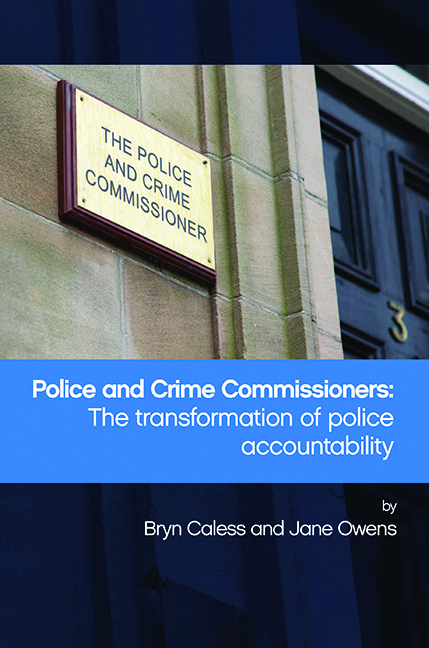Book contents
- Frontmatter
- Dedication
- Contents
- List of tables and figure
- Glossary of terms
- Acknowledgements
- Introduction
- one Governance: the Police and Crime Commissioner and police accountability in context
- two The psephology of the November 2012 election: motive, means and opportunity
- three Is the law on my side? Relationships between the PCC and the chief police officer team
- four Partners, colleagues or rivals for oversight? The (PCC) art of making friends and influencing people
- five “Putting yourself about”: PCCs, the media and the public
- six The debate with no end: PCCs’ remit and the problems of policing
- seven “I wonder if the game is worth the candle”: PCCs, their ‘work–life balance’ and their future
- General summary
- Bibliography
- Appendix Interview questionnaires
- Index
five - “Putting yourself about”: PCCs, the media and the public
Published online by Cambridge University Press: 01 September 2022
- Frontmatter
- Dedication
- Contents
- List of tables and figure
- Glossary of terms
- Acknowledgements
- Introduction
- one Governance: the Police and Crime Commissioner and police accountability in context
- two The psephology of the November 2012 election: motive, means and opportunity
- three Is the law on my side? Relationships between the PCC and the chief police officer team
- four Partners, colleagues or rivals for oversight? The (PCC) art of making friends and influencing people
- five “Putting yourself about”: PCCs, the media and the public
- six The debate with no end: PCCs’ remit and the problems of policing
- seven “I wonder if the game is worth the candle”: PCCs, their ‘work–life balance’ and their future
- General summary
- Bibliography
- Appendix Interview questionnaires
- Index
Summary
‘I know the power of the media and how it [sic] can change minds, influence people and pursue to destruction those in public office who cross them. But I also know how trivial, shallow and petty the media can be, and I am never complacent or unwatchful in my dealings with them. Popularity can turn on a very small issue from warm and friendly to bitterly cold and hostile, so I am careful not to antagonise. At the same time, I will not pander to journalists or help them if they insist on pursuing something irrelevant, counter-productive or silly.’ (PCC Interviewee 68)
‘[J]ust like you have to work the media, so you have to work the public. There's lots of apathy and indifference out there (though people shout loudly enough when they’re burgled, mugged or have things stolen from their cars), and I have to put myself about to make sure that I am constantly in the public eye.’ (PCC Interviewee 59)
This chapter examines the outward-facing roles of the PCC in responding to and developing relations with the media, and in representing and responding to the public as its elected representative. How well do PCCs handle a frequently hostile media and how do they develop positive relationships with the press, TV and radio, as well as mastering the social media functions like Whatsapp, Twitter and Facebook? What is their impact through social messaging? Can we measure or estimate it? How much of the PCC role is spent in interacting with the electorate and what can PCCs do to influence a sometimes indifferent or critical public? These are not just questions about function: the PCC needs positive relations with both media and public if he or she is to make a positive impact, especially among the leaders of influence and opinion in communities all over the PCC's ‘constituency’.
The media
We might argue that, from the start, Police and Crime Commissioners need to have some skills in handling media relations, need a polished self-presentation and must pursue a persistent profiling of their views and achievements, or they would never have been elected in the first place.
- Type
- Chapter
- Information
- Police and Crime CommissionersThe Transformation of Police Accountability, pp. 125 - 152Publisher: Bristol University PressPrint publication year: 2016

